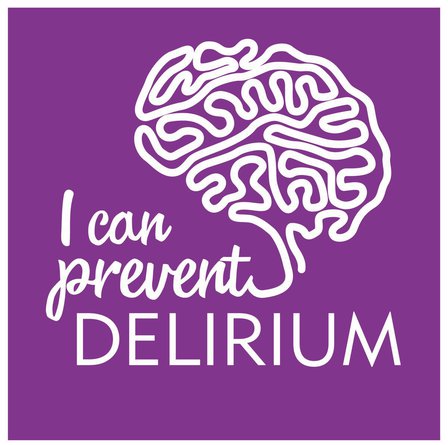What is delirium? (also known as Acute Confusion)

Delirium is an acute confusional state that can happen when someone is ill.
It is a sudden change over a few hours or days, and tends to vary at different times of day. People may be confused at some times and then seem their normal selves at other times.
People who become delirious may start behaving in ways that are unusual for them- they may become more agitated than normal or feel more sleepy and withdrawn.
It may be more difficult to hold a conversation with them or they may ramble and jump from one topic to another. They may not know where they are or think they are some where completely different, on holiday for example.
Sometimes people who are delirious may see things that other people can’t see, or believe things that are not true.
It does not mean that they are going mad or that they will be confused forever.
What causes delirium?
The most common causes are:
- Infection
- Constipation
- Dehydration
- Pain after a fall or surgery
- Reaction to medication
- There are also many other causes of delirium, which are listed on this page
Who can get delirious?
Anyone of any age can, but it is most common in older people and children. People with dementia are more likely to get delirium and cannot always say what is wrong or how they feel.
How do you treat delirium?
The best treatment is to treat the cause.
If you are visiting someone who appears unusually confused they may be delirious and may not remember who you are.
- Be very calm and patient, avoid being confrontational.
- Remind them where they are and who you are.
- Encourage them to drink plenty of water or juice, this can prevent and treat dehydration and constipation.
- They may need treatment from their doctor for an infection, pain or other illness.
How long does it last?
Delirium is not permanent in most people.
In adults who are fairly healthy delirium may only last a few days once the cause has been found and treated.
In older people the effects of delirium can often last longer, and some confusion may still be noticeable for several weeks after the cause has been treated.
What should I do if I am worried about my friend or relative?
If you are worried about your friend or relative you can talk to a member of staff about your concerns.
It is very important to tell a member of staff if you notice that someone has become more confused than usual to make sure that the person gets the care and treatment they need.
Resources
Videos
Awareness video produced by TEWV with collaboration
Websites
Downloads
User Experience: Delirium
Read a real life experience of delirium.

My mum was admitted to hospital after a fall at home, just to check that she was okay and for a few tests to see that she was otherwise healthy. It was when I visited her on the second day of her stay that I noticed she really wasn’t herself. Mum started calling me ‘Twinkle’, a name she hadn’t called me since childhood. She also told me that there were a lot of little dogs on the ward and the barking meant she couldn’t sleep. This really wasn’t like her but I tried to convince myself that she was tired and shaken after her fall.
The next day when I went to visit, one of the nursing staff approached me and asked if mum had behavioural problems, as she’d been pinching items for some of the other patients. I was absolutely horrified, and furious at this suggestion! My mum had worked many years as a school teacher, she had strong Christian values and was polite, honest and very caring. I was instantly reminded of people I had seen in my time working in mental health services who presented as acutely confused and distressed, seemingly due to a mental health issue but on investigation, due to an infection. I explained that my mum had certainly never behaved in any way other than saintly in my opinion, and politely asked the nurse if she had been tested for a urine infection. The nurse gave me a questioning look and informed me that this hadn’t happened as there was no indication that mum had an infection. They were thinking about prescribing some antipsychotics to try to keep mum calm. Trying to be a good visitor and not wanting to cause problems, I left it at that.
Two days later, mum was discharged from hospital – with a prescription for antibiotics. To treat a urine infection. And no antipsychotics.
I never told my mum what she’d been like during those few days in hospital, she would have been mortified.
Awareness of delirium is so important, for all. Sometimes the cause can be so simple but the consequences of it not being picked up can be devastating.